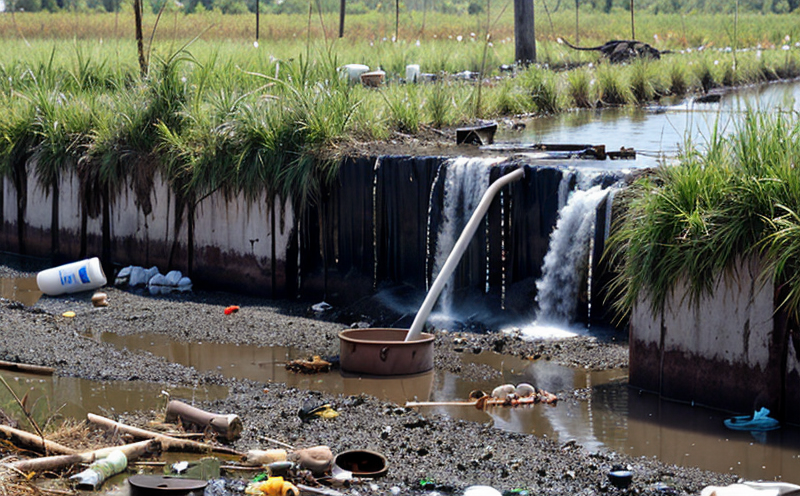Fertilizer Pollutant Testing
Testing for pollutants in fertilizers is a critical aspect of ensuring environmental sustainability and compliance with regulatory standards. The presence of harmful substances in fertilizers can lead to soil, water, and air pollution, thereby affecting ecosystems and human health. This service focuses on the rigorous analysis of fertilizer samples to detect potentially hazardous pollutants such as heavy metals, pesticides, herbicides, and other synthetic compounds.
The process begins with thorough sample preparation, which involves homogenizing large quantities of fertilizers to ensure accurate representation. Following this, advanced analytical techniques like inductively coupled plasma mass spectrometry (ICP-MS), gas chromatography-mass spectrometry (GC-MS), and high-performance liquid chromatography (HPLC) are employed. These methods provide precise quantification and identification of trace elements and organic compounds.
Our laboratory adheres to international standards, including ISO 17025 for quality management systems in testing laboratories and ASTM E1944-18 for the determination of heavy metals in fertilizers. Compliance with these standards ensures reliability and accuracy in our test results.
The importance of this service cannot be overstated. It helps stakeholders, including farmers, manufacturers, and regulators, make informed decisions regarding fertilizer usage to minimize environmental impact while optimizing crop yields. By identifying pollutants early on, corrective measures can be implemented to prevent further contamination.
Our expertise in this domain also extends to providing consultation services for clients seeking to develop or reformulate fertilizers with reduced pollutant content. This proactive approach ensures that our clients stay ahead of regulatory changes and market demands.
In summary, fertilizer pollutant testing is essential for maintaining environmental integrity and ensuring compliance with global standards. Our comprehensive service covers every aspect from sample preparation to final reporting, leveraging cutting-edge technology and adherence to international best practices.
Scope and Methodology
The scope of our fertilizer pollutant testing service encompasses a wide range of pollutants that can potentially be present in fertilizers. These include heavy metals such as lead, cadmium, arsenic, mercury, and selenium; pesticides like atrazine, glyphosate, and chlorpyrifos; herbicides such as diquat and paraquat; and other synthetic compounds.
The methodology employed follows a structured approach to ensure accurate results. Initially, samples are collected from various points in the fertilizer production or distribution chain. These samples undergo rigorous sample preparation techniques, including digestion using strong acids followed by filtration if necessary. The prepared samples are then analyzed using multiple analytical methods tailored to detect specific pollutants.
- Inductively Coupled Plasma Mass Spectrometry (ICP-MS): Used for detecting heavy metals at trace levels.
- Gas Chromatography-Mass Spectrometry (GC-MS): Effective for identifying and quantifying organic pollutants like pesticides and herbicides.
- High-Performance Liquid Chromatography (HPLC): Applied to assess the presence of various synthetic compounds in fertilizers.
After analysis, our team interprets the data meticulously. The results are reported comprehensively, including detection limits and compliance status relative to regulatory thresholds.
Industry Applications
- Farmers: To ensure that fertilizers used do not introduce harmful pollutants into the environment. This helps in maintaining soil health and reducing risks of contamination.
- Manufacturers: To reformulate products to meet stringent environmental regulations and improve product safety profiles.
- R&D Engineers: For developing new formulations that are environmentally friendly and effective in promoting sustainable agriculture practices.
- Regulatory Bodies: To enforce compliance with national and international standards regarding fertilizer quality and environmental impact.
In addition to these primary stakeholders, our service also benefits procurement teams by offering independent third-party validation of supplier claims about the purity and safety of fertilizers. This ensures that only high-quality products are sourced for agricultural use.
Competitive Advantage and Market Impact
Our fertilizer pollutant testing service offers several competitive advantages:
- Compliance Assurance: By providing accurate test results, we help clients stay compliant with local and international regulations.
- Innovation Support: Our services assist R&D teams in innovating safer and more sustainable fertilizer products.
- Purchase Confidence: For buyers looking to source reliable fertilizers, our service offers peace of mind through independent verification.
The market impact of this service is significant. As environmental concerns grow, there is increasing demand for safer and greener agricultural inputs. By offering robust testing services, we contribute to reducing pollution risks associated with fertilizer use, thereby promoting healthier soils and ecosystems worldwide.





